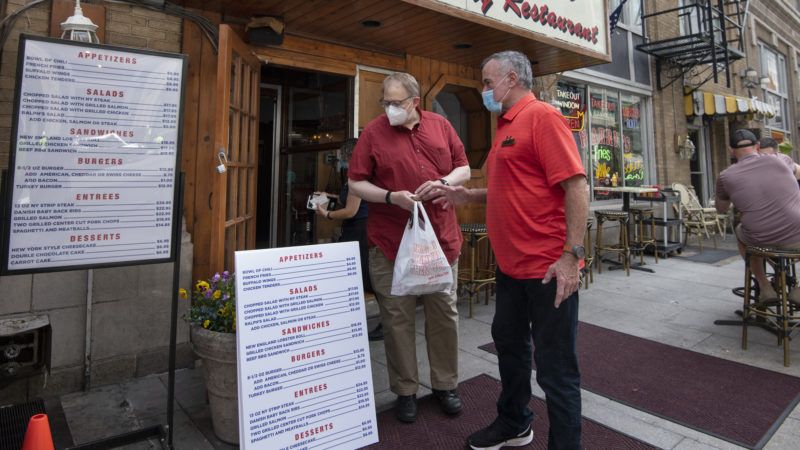Markets Are Finding Ways To Survive the COVID-19 Shutdowns
Even after government had imposed an almost unfathomable level of intervention on the economy, the markets are chugging along much better than expected.

A funny thing happened on the way to the next Great Depression. The government forcibly halted economic activity, shutting most Americans indoors and robbing millions of people of their chance to earn a living as a means to prevent the spread of coronavirus. Yet many of the nation's economic indicators remain remarkably steady.
"By the day after Memorial Day, though, Wall Street had regained some stability, far more than many expected in the darkest days in late March," the Detroit Free Press reported on Wednesday. "The Dow was only a few points shy of the 25,000 mark—right around where it was on March 10 before the market would tumble to coronavirus-lows two weeks later."
Since the stock market's initial post-DOVID-19 drop, I've been afraid to check my 401k account given that I'm already running low on blood-pressure medicine. Sure enough, the balance wasn't far off from my last check-in. The nation's housing markets, which analysts expected to head into a freefall after the shutdowns halted open houses, were as boisterous as ever.
"Believe it or not, the economic turmoil inflicting the United States could send home prices soaring," argued British-based journalist Simon Chandler. Low interest rates, fewer listings and a reduction in housing starts means less supply and continued strong demand. The market is rapidly adjusting to—and I despise using this term— the New Normal. Everything is volatile, but there's no indication of a repeat of 2008's meltdown.
Let's remind ourselves about the meaning of "markets." Progressives think of them as an evil conspiracy by capitalists to enrich themselves and keep others in penury. Even some populist conservatives are convinced that "unfettered capitalism" is a plot by greedy "plutocrats" to place filthy lucre above the nation's "culture." There's nothing unfettered about our highly regulated economy, but whatever.
In reality, markets are simply the sum total of the myriad decisions made by individuals. In a relatively free economy, people adjust their behavior based on their own priorities. We bid for things we want. If I'm eyeing a house that is worth $400,000 to me, but someone is willing to pay $425,000 for it, then that buyer gets it. If I'm selling a house for $400,000 and the best offer that I get is $375,000, then that's what it's worth in the market.
"Underlying most arguments against the free market is a lack of belief in freedom itself," wrote free-market economist Milton Friedman. It's not about greed, but freedom. "Is there some society you know that doesn't run on greed?" Friedman asked. "What is greed? Of course, none of us are greedy, it's only the other fellow who's greedy. The world runs on individuals pursuing their separate interests."
When government tries to ameliorate "greed," it only distorts individual choices by artificially limiting (or increasing) supply or demand. Even with such distortions, markets are amazingly nimble. Plus, government officials and the groups that elect and lobby lawmakers are just as greedy as anyone else. More so actually, given that these groups will use the power of government, rather than the principles of free exchange, to get what they want.
I often complain about government growth controls, subsidies and regulations that tangle up our housing markets or impose unreasonable costs on private businesses. Nevertheless, buyers and sellers figure out ways to keep buying and selling despite those interventions. Now, even after government had imposed an almost unfathomable level of intervention on the economy, the markets are chugging along much better than expected.
That doesn't mean that those shutdowns were necessary or aren't painful. People have lost their jobs, businesses and a great deal of income. That will play itself out somehow. We're already seeing that governments are expecting great losses of revenue (note California's $54 billion deficit). I don't lie awake at night worrying about budget cuts, but they are looming.
The pension funds will dodge a bullet if the stock market stays high, but these aren't market problems. They are problems caused by government officials who refuse to live within their means. California's outrageously generous public pensions had been consuming local budgets and were frighteningly underfunded even before the recent unpleasantness.
There are plenty of doom-and-gloom scenarios, circulating on social media and elsewhere. Remember the analysts who forecast that oil prices would explode and our entire system of moving around goods would collapse, destroying suburbia in the process? Gas prices are lower than ever. Or the pundits who have long predicted a coming "Greater Depression" that would leave the economy in shambles?
We shouldn't be surprised if the encouraging news turns sour. Markets go up and down, and understandably are uncertain after this government-imposed craziness. But I would caution against fretting about dystopian predictions without first thinking about the resiliency of relatively free people operating in relatively free economies. Markets are amazing things, which is more than I could say about governments.
This column was first published in the Orange County Register.


Show Comments (39)